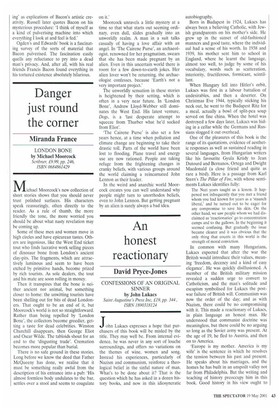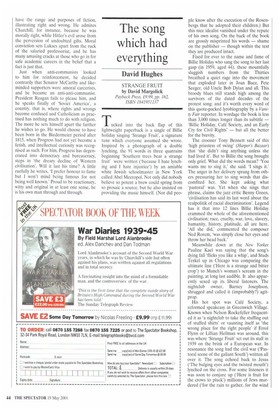An honest reactionary
David Pryce-Jones
CONFESSIONS OF AN ORIGINAL SINNER by John Lukacs Saint Augustine's Press Inc, £19, pp. 344, ISBN 1890318124 John Lukacs expresses a hope that purchasers of this book will be misled by the title. They may well be. From internal evidence, he was never in any sort of louche surroundings, and offers no variations on the themes of wine, women and song. Instead his experiences, particularly of Nazism and communism, reinforce a theological belief in the sinful nature of man. What's to be done about it? That is the question which he has asked in a dozen history books, and now in this idiosyncratic
autobiography.
Born in Budapest in 1924, Lukacs has always been a believing Catholic, with Jewish grandparents on his mother's side. He grew up in the sunset of old-fashioned manners and good taste, where the individual had a sense of his worth. In 1938 and 1939, his mother sent him to school in England, where he learnt the language, almost too well, to judge by some of his vocabulary, words such as scatteration, interiority, fructiferous, formicant, scintillant.
When Hungary fell into Hitler's orbit, Lukacs was first in a labour battalion of undesirables, and then a deserter. On Christmas Eve 1944, typically sticking his neck out, he went to the Budapest Ritz for a meal, actually a bowl of split-pea soup served on fine china. When the hotel was destroyed a few days later, Lukacs was hiding in a cellar while the Germans and Russians slogged it out overhead.
One of the pleasures of this book is the range of its quotations, evidence of aesthetic responses as well as sustained reading in several languages, from Hungarian writers like his favourite Gyula Kxtidy to Jean Dutourd and Bernanos. Ortega and Dwight Macdonald (a close friend and quite as rare a bird). Here is a passage from Karl Stern's The Pillar of Fire, with whose sentiments Lukacs identifies fully:
The Nazi years taught us a lesson. It happened not infrequently that you met a friend whom you had known for years as a 'staunch liberal,' and he turned out to be eager for any compromise to save his skin. On the other hand, we saw people whom we had disclaimed as 'reactionaries' go to concentration camps and to the gallows. In the beginning it seemed confusing. But gradually the issue became clearer and it was obvious that the only thing that counts in this world is the strength of moral conviction.
In common with many Hungarians, Lukacs expected that after the war the British would introduce their values, meaning 'freedom, decency and a kind of easy elegance'. He was quickly disillusioned. A member of the British military mission revealed a sudden urge to convert to Catholicism, and the man's solitude and escapism symbolised for Lukacs the postwar failure of British will. Communism was now the order of the day; and as with Nazism, there could be no compromising with it. This made a reactionary of Lukacs, in plain language an honest man. He understood that communist doctrine was meaningless, but there could be no arguing so long as the Soviet army was present. At the age of 19, he fled to Austria, and then on to America.
'Europe is my mother. America is my wife' is the sentence in which he resolves the tension between his past and present. He speaks about his marriages, and the homes he has built in an unspoilt valley not far from Philadelphia. But the writing and teaching of history preoccupy him in this book. Good history in his view ought to have the range and purposes of fiction, illustrating right and wrong. He admires Churchill, for instance, because he was morally right, while Hitler's evil arose from the perversion of undoubted gifts. Moral conviction sets Lukacs apart from the ruck of the salaried professoriat, and he has many amusing cracks at those who go in for safe academic careers in the belief that a fact is just that.
Just when anti-communists looked to him for reinforcement, he decided contrarily that Senator McCarthy and likeminded supporters were amoral careerists, and he became an anti-anti-communist. President Reagan fails to please him, and he speaks finally of 'Soviet America', a country, that is, where rights and wrongs become confused and Catholicism as practised has nothing much to do with religion. The more he sets himself apart the further he wishes to go. He would choose to have been born in the Biedermeier period after 1815, when Progress had not yet become a fetish, and intellectual curiosity was recognised as such. For him, Progress has degenerated into democracy and bureaucracy, steps in 'the dreary decline of Western civilisation'. Will it last his time? A little ruefully he writes, 'I prefer honour to fame but I won't mind being famous for not being well known.' Proud to be reactionary, witty and original in at least one sense, he is his own man through and through.



































































 Previous page
Previous page